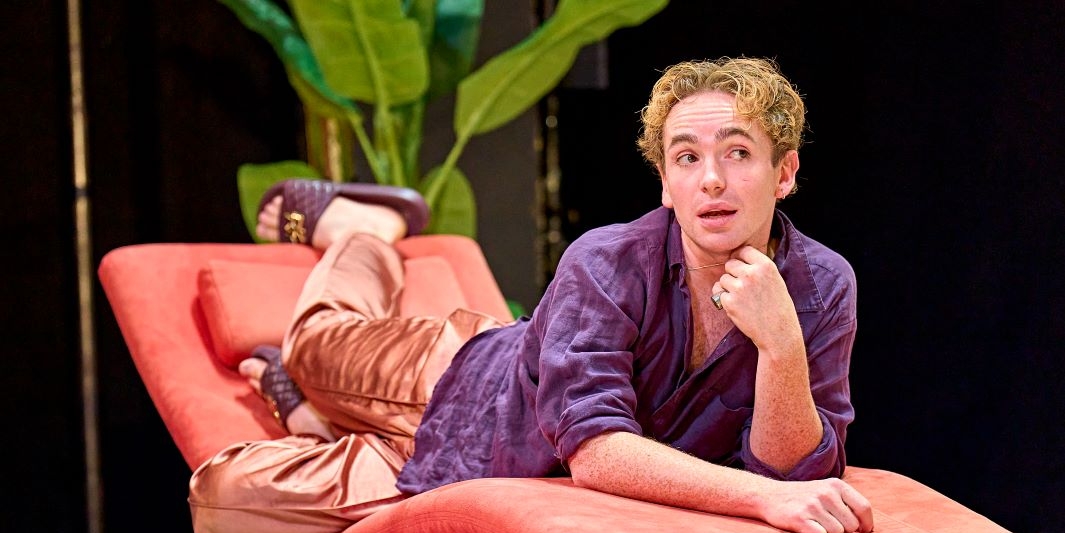It is not often these days that a new comedy arrives that self-consciously models itself on Wilde and Wodehouse. On the face of it ‘The Importance of Being Earnest’ and Jeeves and Wooster seem a world away from any satire of London’s ruling elite. But just as Wilde and Wodehouse created the logic of their own creative universes, so here Rory Mullarkey creates a set of bizarre characters and situations that work on their own terms with a measure of wit and occasional pathos that suspends disbelief for the duration.
We find ourselves looking at a swanky split-level apartment in South-West London, home to an unreconstructed toff of a viscount, ‘Tug’ Bungay. He seems to be a fairly harmless but feckless fellow, running up huge bills, and running away from an on-off engagement to girlfriend Finty and his demanding mother, Agrippina, while enjoying the support of a long-suffering housekeeper, who herself has eccentric commitments to the values and beliefs of Soviet Communism. The first act (of three) introduces us not only to these characters but also to Charlton Thrupp, a gay eccentric traveller, full of naive charm and best friend to ‘Tug.’
Once it becomes clear that Lady Agrippina is determined to sell the family seat, Dimley Grange, to pay off Tug’s accumulated debts and finance her elopement with her accountant then things take a decidedly farcical turn. A Russian oligarch, Oleg Govorov, has expressed a desire to purchase the property, but various characters assume his identity in order to thwart the sale. An elaborate concatenation of misunderstandings and confusions dominates the middle of the play, as the verbal wit gives way to situation comedy and slapstick, before a sudden shift in mood at the denouement towards more serious reflections on both the state of the country and the fates of the characters.
Not all of this works. There are flat patches of exposition and too many tiresome visual gags. It is perhaps worth remembering that the original version of ‘The Importance of Being Earnest’ had a whole other act which was cut in the final version. Less would certainly be more in this instance. However, the effortlessly spirited playing and the penetrating and precise quality of the verbal bravura are consistently inventive and entertaining. Writing of this standard is rare and was much appreciated by a fairly raucous press night audience who relished the many topical political jokes and social observations.
The cast are clearly enjoying themselves hugely and that helps get this play across to its audience with wonderfully deadpan comic timing. In the lead role Laurie Kynaston is dreamily gormless and selfish, but also finds a sadness and self-knowledge at the end that is genuinely affecting. Fenella Woolgar has a ball as his mother, a ‘Lady Bracknell’ role that is a gift to a talented actor. However, she finds a softer side too with her lover, Simone, played by Karina Fernandez. The latter adopts an outrageous French accent which is as exaggerated as her judgement of the other characters is pin-sharp. Amy Booth-Steel also has great fun as the housekeeper, both larger-than-life in her own right and the direct descendant of the long-suffering yet withering servants you find not just in Wilde and Wodehouse, but also in Coward. Natalie Dew and George Fouracres offer feisty support not just as girlfriend and best buddy, but also in beautifully detailed caricatures of an oligarch; while the former offers a further long monologue at the end (while scenery is adjusted) that could have come from the pen of Bulgakov. Philipp Mogilnitskiy makes a late appearance as the real Oleg, but comes into his own in the final scenes.
The creative team have a lot to do, especially in the later acts, where a castle has to appear and then catastrophically disappear. At times it seems as though this is a play that is in search of an ending, like a piece of music that tries out different moods in succession before settling on one that is hard to relate to what has gone before. But it is all a lot of effervescent fun, and everyone rises to the challenge and joy of a superior, scrupulously crafted script.

